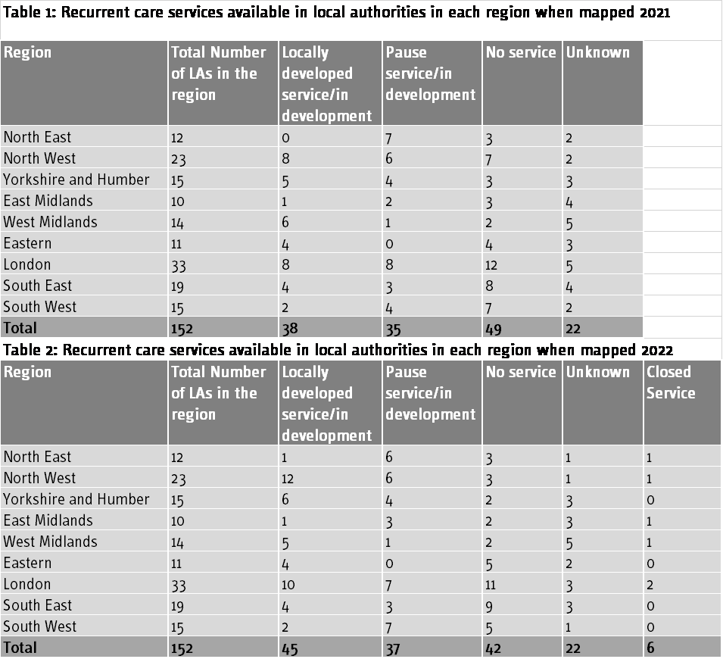'A family justice system ‘that removes the fourth, fifth or sixth child from families without doing anything about the reasons for removal is a failing system’
Nicholas Crichton, founder and champion of the Family Drug and Alcohol Court, Cited by Fouzder in Law Society Gazette 2018
We are pleased to publish an updated mapping of services across England working with parents who have experienced recurrent care proceedings. Our thanks to colleagues at Nuffield Family Justice Observatory who co-produced the map infographic.
This work is the product of our ongoing partnership on recurrent care with the Centre for Child and Family Justice Research (CFJR) at Lancaster University. We first mapped these services in 2021. The detailed survey and interview research we carried out then allowed analysis of the core components of these services, which share approaches that:
- Use assertive and flexible outreach to build relationship-based practice with parents.
- Offer trauma-informed approaches, one core aspect of which is the recognition of parents’ loss and grief.
- Provide a variety of therapeutic and practical supports including attention to sexual and reproductive health and to building parents’ capacity to develop healthy relationships.
 Closed Service: A recurrent care service was in place in 2021 but has since closed.
Closed Service: A recurrent care service was in place in 2021 but has since closed.
No Service: The local authority has confirmed there is no service/prior service in this area.
Unknown: No information has been provided by this local authority.
There have been promising and notable changes over the last 12 months.
In 2022 we mapped an increased number of locally developed and of Pause services. We also noted the addition of two new Family Drug and Alcohol Court teams, bringing the Family Drug and Alcohol Court total to 16 across the UK. Evaluations continue to show these services are having a positive impact.
A vibrant Community of Practice hosted by Research in Practice and co-funded by the Segelman Trust began in 2020 and brings almost all of these ground-breaking services together to develop the work of this emergent area of practice. This community has a great deal of valuable, knowledge and experience to share with the wider sector.
However, the national picture remains uneven and inequitable. The 2022 mapping underlines the precarious funding position of these services, which are working to meet needs otherwise left unmet by either Adult or Children’s Services. Six services we spoke to in 2021 have since lost funding and are no longer in operation. There remain 42 local authority areas in which there is no service of this kind, and 22 places for which we were unable to obtain data. Most of the existing services operate with small teams, unable to meet the demand within their own local area.
This insufficiency across the country is reflected in new research published this week by Nuffield Family Justice Observatory and carried out by the Family Justice Data Partnership, building on the programme of work over nearly a decade led by Professor Karen Broadhurst, Claire Mason and colleagues at CFJR.
The new research shows that, almost a decade on from the first study on recurrence, approximately one in four mothers are still at risk of returning to court. In addition, the actual number of mothers in recurrent proceedings has increased, with more families involved in care proceedings since the earlier studies were published.
Lisa Harker, director of Nuffield Family Justice Observatory, said:
‘Despite almost a decade of research into recurrence and associated innovation in services, not enough has changed for these women. They are not even being given a fighting chance of avoiding further proceedings. While ground-breaking support services are available – without which the number of mothers in recurrent proceedings would undoubtedly be higher – they are only meeting a fraction of the need. This situation won’t be helped by austerity measures threatening to limit public services even further.’
Professor Karen Broadhurst from Lancaster University said:
‘The new statistics indicate much more needs to be done if we are to provide all mothers in care proceedings with the opportunity to overcome the many hardships that characterise their lives. I am particularly concerned about the age profile of the young women in care proceedings and their life chances beyond care proceedings, given the highly stigmatising and isolating experience which is child removal.’
‘The best efforts of practice pioneers are currently compromised by short-term skeletal funding due to a lack of political will to invest properly in the lives of the most vulnerable. I fear the outlook is gloomy, given acute inflationary pressures on families (such as food and energy) and no material uplift in funding for Children’s Services in the face of increasing need. These twin pressures will be faced most severely in the most deprived communities, which are concentrated in the North.’
We at Research in Practice are enabled by the Segelman Trust’s continued support to host the vibrant Community of Practice into 2023, and invite any practitioners working in this space and not yet a part of the community to contact us at ask@researchinpractice.org.uk.
We hope the Care Review implementation board and other national policy stakeholders will consider the mapping work, the Nuffield Family Justice Observatory research and the promising evaluation evidence to date on these services, and take note of the words of Nicholas Crichton’s words in 2018. We are still ‘failing’ to respond equitably to this issue; we need to ensure targeted and sustained funding for services to stem the tide of recurrence.




